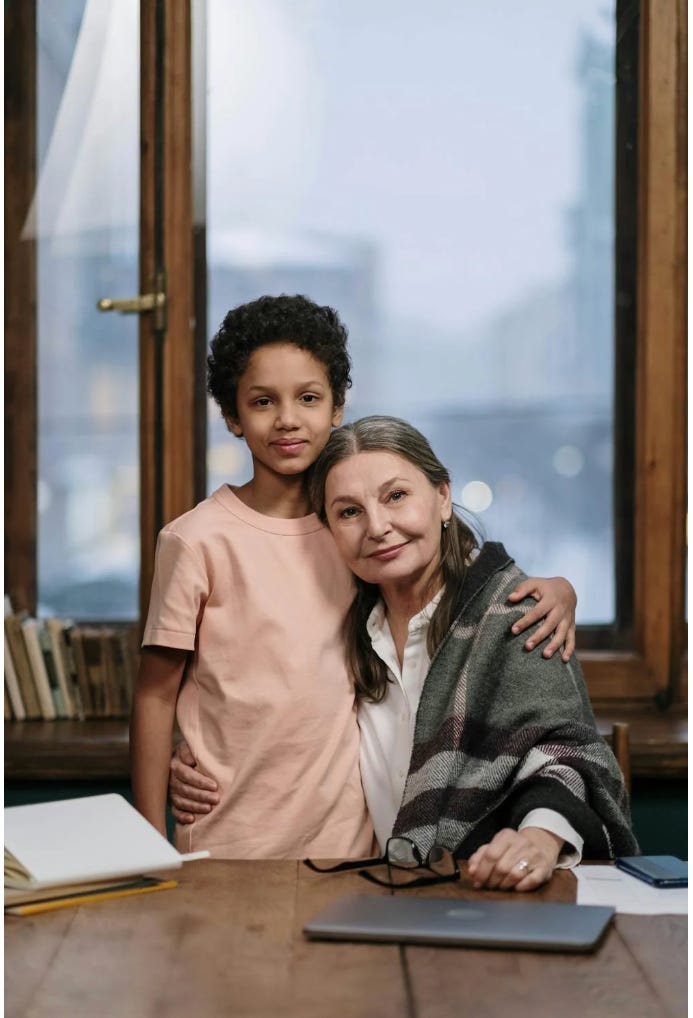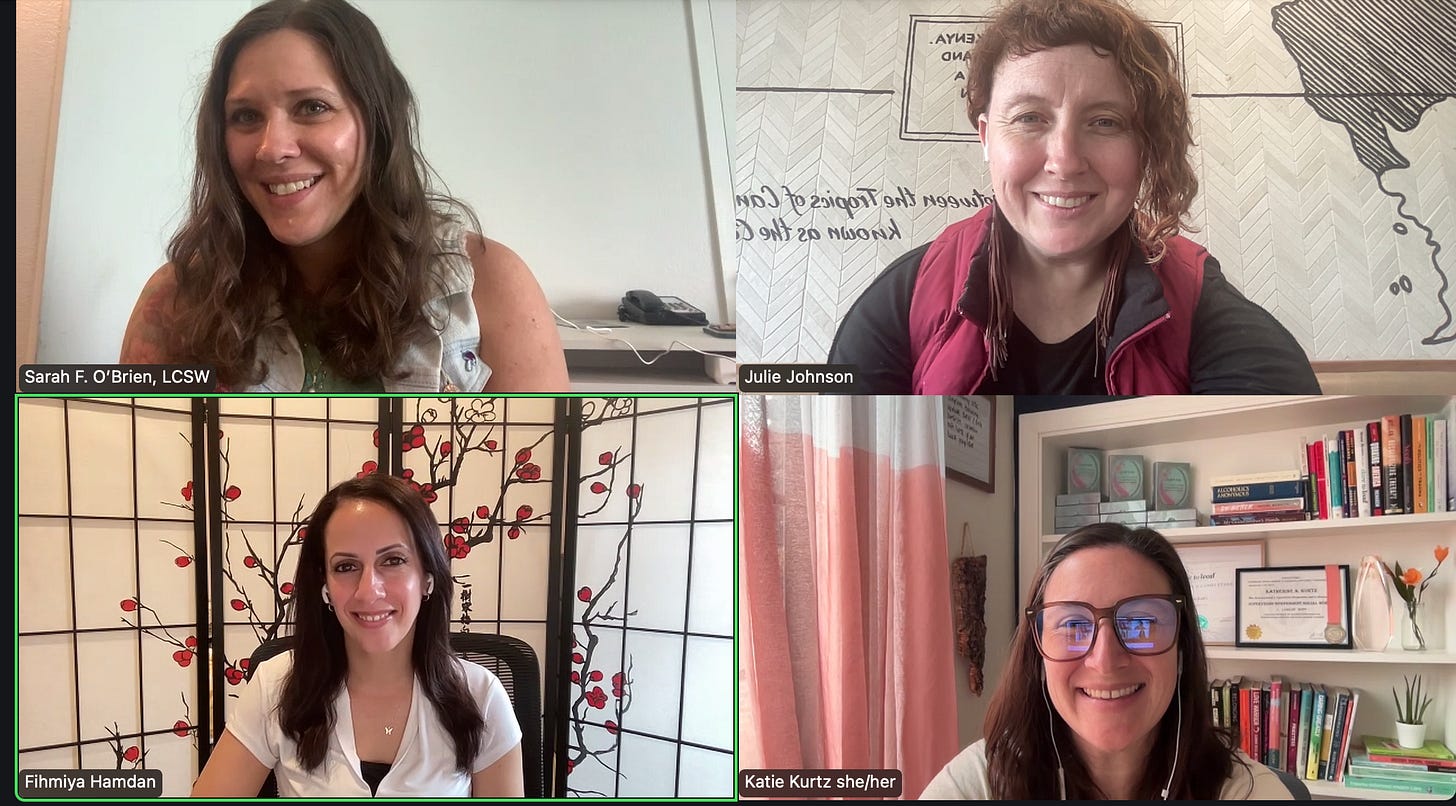Decentralizing Healing
Validation: The Relationship Skill We Need to Heal, Lead and Grow
Welcome to This Month’s Newsletter! 🌟
We’re thrilled to bring you our latest article featuring the incredible Sarah O’Brien, LCSW. But before we dive in, we want to introduce you to something close to our hearts: the Let’s Integrate App and the powerful concept of “decentralizing healing.”
Healing Starts Here. 💛
Imagine a space designed just for you—a decentralized, trauma-informed community where healing is private, supported, and compassion-focused.
Meet the Let’s Integrate App: a grassroots digital space built for survivors. Here’s why it’s special:
✅ No ads. Your focus stays on healing, not distractions.
✅ Pure privacy. Your data is yours—always.
✅ Vetted facilitators. Every guide is trained in trauma-informed care.
✅ People-first design. Heal at your own pace, supported by a compassionate community.
Digital spaces like this matter. They empower survivors, foster real connections, and prioritize people over profit.
💛 You matter. Your healing matters.
📲 Download the Let’s Integrate App today and start creating a space that supports both you and your nervous system.
Now, let’s dive into our feature with Sarah O’Brien, LCSW teaching us all about
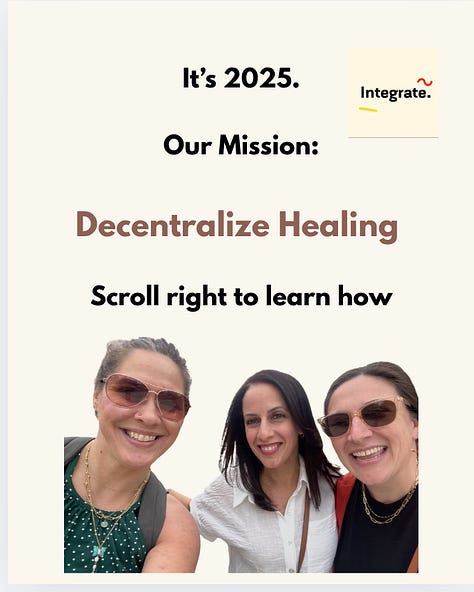
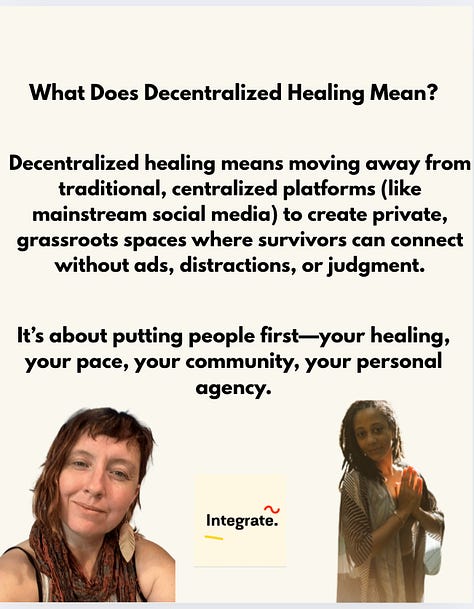
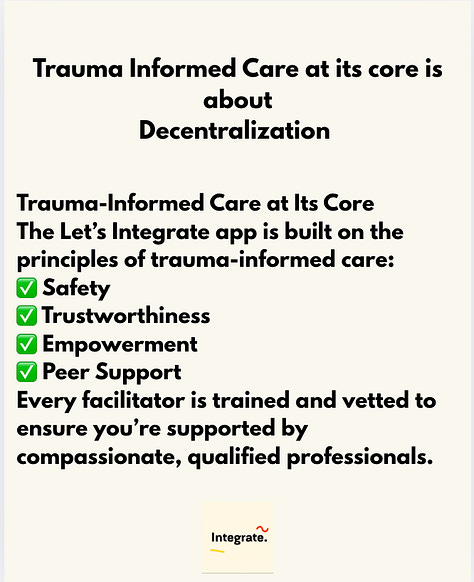
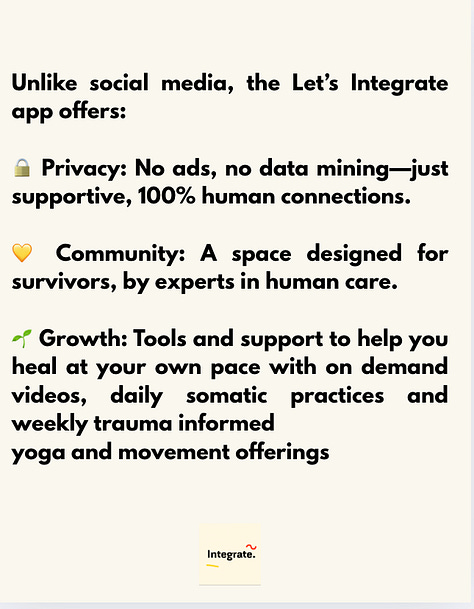
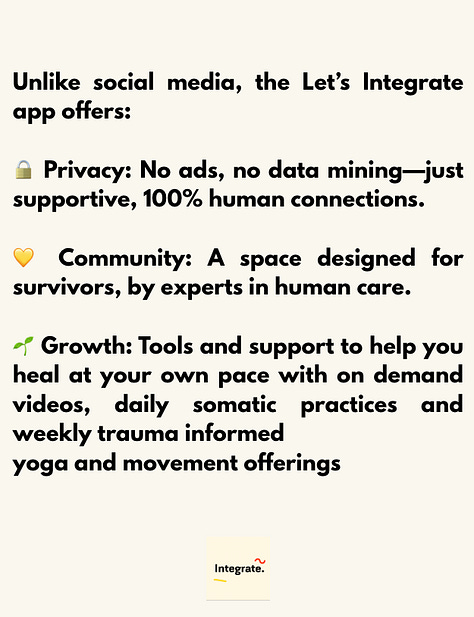
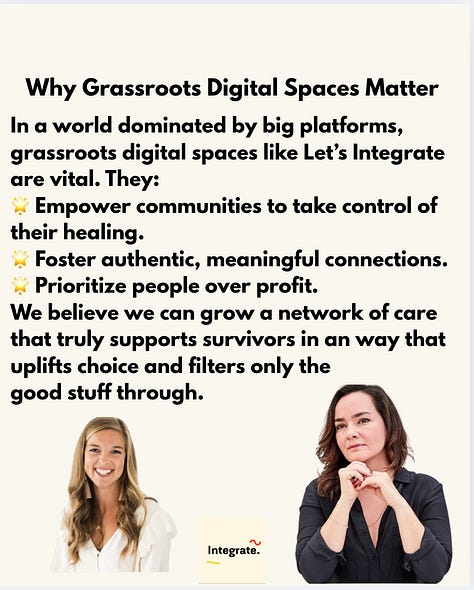
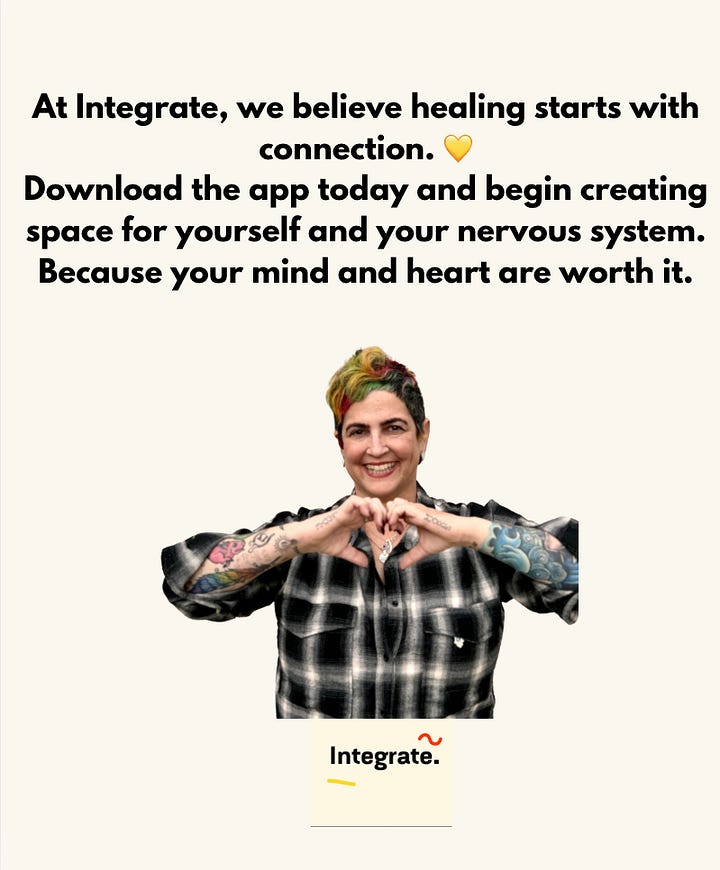

Seen, Heard, Accepted: Why Validation Matters
Why Validation Matters
Everyone wants to feel that they matter. They want to be heard and seen, and they want their feelings to be understood and accepted, I mean, don’t you? I certainly do so this makes a lot of sense to me. Especially as someone who grew up in a tumultuous and traumatic environment where lots of invalidation occurred, meaning I was often dismissed, ignored, judged or criticized for how I felt, what I thought, what I needed. I did not know the impact of this early environment until much, much later in my life. Let me say, the impact of never being validated and never learning how to validate others has been astronomical.
Starting with the Self
Let’s start with the self. This is where all good interpersonal behaviors stem from: ourselves. It’s certainly possible to validate others, even when you don’t know how, or can’t, validate yourself. I did this for years as a friend and psychotherapist. I probably learned how to do this from others and heavily in my education and training to become a clinical social worker. Validating someone’s feelings and experiences is a core responsibility for a therapist. However, learning that I needed to do this for myself, and my feelings, and my experiences didn’t quite make it into view. Knowing that I didn’t get validation from my parents in early life was easy to recognize. Understanding the impact of constant invalidation in my formative years was absolutely not easy to recognize.
The Impact of Invalidation
The impact? Lots of negative self-talk and pervasive negative self-view. Perfectionism. Big feelings that were unmanaged. Isolation and loneliness. Confusion and frustration. Hopelessness. How would a person be able to regulate their emotions if they think that all of their feelings are wrong? This negative view can be internalized, which is why shame occurs. A person who feels that their emotions are not "wrong" or inappropriate is more apt to have a solid sense of identity and worth and can manage emotions more effectively. It’s textbook. I was invalidated repeatedly as a child so I internalized pretty much everything I did, said, felt, believed, or expressed as wrong. It wasn’t the right feeling, or the correct thought, or the right way to react, or the correct way to express and since this is the message I got all of the time I felt like I wasn’t right all of the time. But how can a feeling be wrong? What exactly am I supposed to do when I am disappointed and hurt when my mom yells at me? How exactly am I supposed to change my disappointment and hurt, my natural feelings, because my mom says it’s not okay to be upset about her yelling me because I did XYZ? As a child and teenager, I was confused as hell, and working my ass off to get it ‘right.’
Why? Why would I work my ass off to get feelings ‘right’? Because I would not be seen, heard, acknowledged, supported, loved if I got it wrong. That was my experience.
Feelings Aren’t Right or Wrong
So, guess what happened? I experienced many instances throughout my life of being invalidated because it’s IMPOSSIBLE to get feelings ‘right.’ There’s no right or wrong when it comes to feelings. They just are. We just feel things. But constantly hearing it’s ‘not okay’ to feel this way means I kept trying so that it would ‘be okay.’ I kept trying so that someone would say “it’s okay.” I kept working, changing, adjusting, questioning my own feelings and experiences because I kept hearing ‘it’s not okay.’ I wanted desperately to hear “it’s okay, Sarah. I understand why you’re so upset about this, it makes sense. I’m not mad at you, I understand.” But that message never came, at least not from my parents or family. So, for a long time, I lived in a space where my feelings (and views, and needs, and desires) we not okay to have. Over time, I repressed so many things and fell heavily into people-pleasing behaviors so that I would be seen by others, liked by others, loved by others. This is what I had learned. I had learned that catering to someone else’s feelings, needs, desires, choices meant that they would be there for me, be present with me, spend time with me, include me…love me.
The Cycle of People-Pleasing
Boy, is that false! I did that, year after year after year. It did not lead to feeling seen, known, accepted and loved. Instead, it led to angry outbursts, hairline trigger of big emotions, excuses for my outbursts (since no one was ever listening to my feelings otherwise), inability to manage my big emotions, and distance and separation from others—something I desperately was trying to avoid…yet STILL getting it wrong every time. I could not crack the code of receiving love, attention, acceptance, support. I did not understand what was wrong with me. I did not understand why I couldn’t get people to see me and be with me. I was doing everything everyone else wanted from me, I did my best to be perfect in the ways I thought I was to be perfect, hoping that was the way.
Validation in Childhood: Building Emotional Competence
Validation is especially important when raising children because the child’s perception of self is largely formed through reflections in communication with other people. This means other people—usually caregivers or parents—are the first folks to provide a sense of self for a child. They are the first folks who lay a foundation for social-emotional learning. What they reflect back to you is what you internalize (without realizing or registering that you’re learning it). A supportive environment for a child’s emotions, feelings, and reactions develops the child’s emotional competence and teaches the child to react adequately to their surroundings. Essentially the child learns that their feelings are okay, they are soothed when feelings are big, and over time learn how to manage these feelings and respond to their environment appropriately. This is usually modeled in behavior rather than explicitly taught through verbal communication. Growing up with invalidation, or experiencing it repeatedly, leads to limiting beliefs and repressed feelings, both of which can start harming us.
The Struggles of Emotional Sensitivity
If you weren’t one of the lucky ones (also like me) who had parents who did this, then you may be a person who struggles with a solid sense of self, self-confidence, self-compassion, judgmental views, and poor management of emotions (or poor emotional regulation). For emotionally sensitive people (also like me), managing emotions so they can communicate most effectively means learning to manage the intense emotions they experience on a regular basis. If you feel things often and with intensity yet you don’t know how to 1) validate your emotion 2) name it accurately (levels 1 & 2 of validation) then you likely will have trouble 3) accepting how you feel AND 4) regulating that emotion in effective and healthy ways. Acknowledging that the internal experience exists and that it’s understandable comes before self-kindness & self-compassion. We have to FIRST acknowledge and accept an emotion as ‘okay’ before we can engage in behaviors that are helpful over harmful. This means accepting that big feeling of anger before we can engage in healthy coping, or emotional regulation, skills. I can’t, let’s say, go for a walk or a run, or turn music up real loud, or practice rapping or memorizing lyrics (all ways I now manage big feelings of anger) IF I FIRST DON’T ACKNOWLEDGE AND ACCEPT THAT I, IN FACT, FEEL ANGRY RIGHT NOW. Doesn’t matter why I’m angry, I just need to acknowledge that I am indeed angry.
Acknowledgment as the First Step
An anxious and isolated (or traumatized) person first needs to be noticed in their pain, suffering and isolation. The person needs to be seen with their reality. When someone joins them in their reality, listens to and validates feelings, then healing, and reduction of suffering can begin. This is true in the moment with that child who is upset and crying. Reduction of their suffering can begin only when their caretaker FIRST acknowledges they are upset and lets them know that it’s ‘okay’ for them to be upset about whatever it is. And this is true for that adult who is angry and hurt (and lashing out as a result, maybe also crying). Reduction of their suffering can only begin when FIRST someone acknowledges they are angry and hurt and lets them know it’s ‘okay’ for them to be angry and hurt about whatever it is. This acknowledgement and communication that it’s okay can come from within, or externally from others. It’s hard for this to come from within if no one has ever modeled it to you for you. That’s why learning to do this for others is so important. Even as adults, many of us have never experienced validation for our experiences, and when another person (adult) acknowledges and accepts our experience as true and real for us THEN our pain and suffering can start to dissipate.
The Power of Validation as a Trauma Informed Skill
I know I said it starts with self. And it does. You must be aware of your early experiences, be aware of their impact on you, and be willing to address anything causing problems internally (in your mind, body, brain, and nervous system) and externally (in interpersonal interactions and relationships with others). This might look like getting a therapist to flesh this out in real time, and receive that first modeled response of validation from them, and then you can start doing it for yourself. Then you must practice validating yourself, acknowledging your experiences and pain as real and valid, telling yourself it’s okay to feel what you feel given what’s happened or what you’ve been through. Then you must practice being kind and compassionate towards yourself in these vulnerable spaces, experiencing these vulnerable feelings. Only then are you truly able to extend that validation and compassion to someone else when they are in a vulnerable space or experiencing vulnerable feelings. It’s really, really hard, if not impossible, to be present for someone else’s emotions, pain, discomfort, reality if you’re not first present for your own emotions, pain, discomfort, reality. And if you can’t be present with someone in their reality (which may be uncomfortable) then you can’t validate them either. Validation is a skill. It’s a learned skill. It’s a trauma informed skill. It requires understanding and then practice to do this well. And we need to do it well for ourselves first and foremost. So, if trauma informed care or leadership is your thing, then you better know how to validate yourself and validate others.







